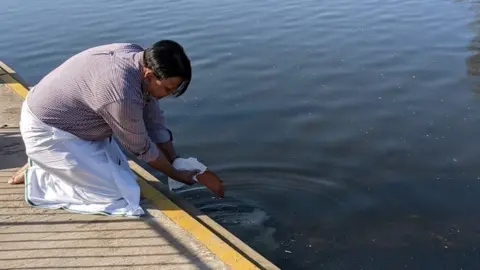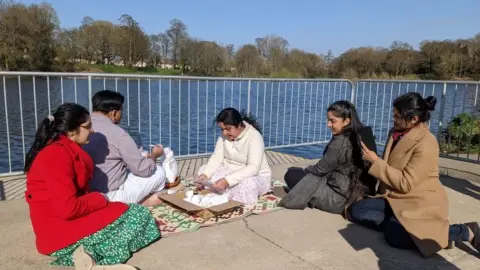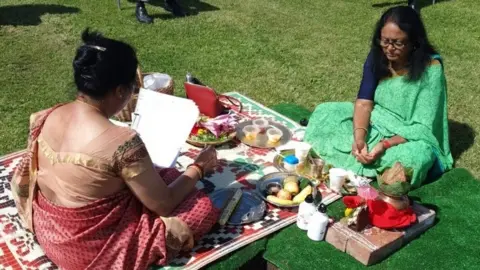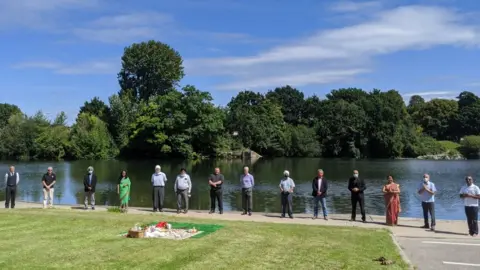Sikh and Hindu ashes scattering site opens in Cardiff
 Antim Sanskar Group Wales
Antim Sanskar Group WalesA site where Sikhs and Hindus can scatter the ashes of loved ones has been officially opened in south Wales.
It is traditional in both religions for bodies to be cremated and their ashes scattered into flowing water to be carried out to sea.
The site at Llandaff Rowing Club in Cardiff, on the River Taff, is the first of its kind in Wales.
Channi Kaler, from the Antim Sanskar Group Wales (ASGW), said he was "really excited" before Saturday's ceremony.
Mr Kaler began searching for a site for people from the Sikh and Hindu communities after his sister almost slipped into a river while scattering his father's ashes at Pontsarn, Merthyr Tydfil, in 2012.
He said: "My sister, who had come from California, was with us and we went to scatter the ashes.
"Because it was a rainy day, the bank was quite slippery and she slipped and nearly fell into the river. It could've been a nasty accident."
 Antim Sanskar Group Wales
Antim Sanskar Group WalesMr Kaler, a Tanzanian-born Sikh who moved to Wales in 1961, contacted the Hindu community and together they formed the ASGW.
The group then spent several years looking for a suitable spot for people to perform the last rites of dead family and friends, with the rowing club eventually agreed with Cardiff council.
Anyone who wishes to scatter ashes there can book to use the site - a pontoon shared with the rowing club - close to Llandaff Weir.
Mr Kaler, from Caerphilly, said he was only aware of one other dedicated site in the UK, in Leicester.
The pontoon has been in use since November, although Covid restrictions have prevented it being officially opened until now.
 Antim Sanskar Group Wales
Antim Sanskar Group WalesRadhika Kadaba, the general secretary of the ASGW and the Hindu Council of Wales, has already used it to scatter her father's ashes after her family was unable to travel to India, where cremated remains are traditionally scattered into the River Ganges.
She said: "Last year, at the beginning of the pandemic, we lost my father. Usually we take the ashes back home to India, but obviously we haven't been able go to India or travel anywhere.
"My children couldn't come to his funeral either, they're all in England."
She added the opening of the site had come "at the right time" for the communities, particularly after the pandemic, with her children able to gather a few months ago to scatter her father's ashes.
Vimla Patel, chairwoman of the ASGW, said the site was also very important to British Hindus and Sikhs who feel most strongly connected to the UK and wish to have their ashes scattered here.
She said: "This is an important aspect of the last rites for the departed souls.
"There are three generations of Hindus and Sikhs living in Wales. They used to take the ashes to the motherland and now people want to scatter their ashes in Wales."
 Antim Sanskar Group Wales
Antim Sanskar Group WalesThe platform was officially opened on Saturday at a ceremony attended by members of Cardiff council and First Minister Mark Drakeford.
A Cardiff council spokesperson said: "The ASGW have been working with the council for a number of years to identify a suitable location where cremated remains can be dispersed into a flowing water course - as is the tradition of the Sikh and Hindu faiths.
"Several areas have been considered over this time, but this location and partnership with the rowing club proved to be the best option by far and was welcomed by the group when first suggested.
"It has taken some time to get the platform in place due to engineering issues, as well as problems caused by the pandemic, but we now have a permanent and managed location that will be used by the current and future generations of the Sikh and Hindu communities."
